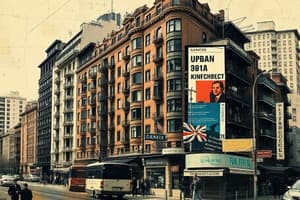Podcast
Questions and Answers
What factor significantly influences land value according to the location within the city?
What factor significantly influences land value according to the location within the city?
- Distance from the PVI (correct)
- Proximity to parks
- Community amenities
- Presence of public transport
Which of the following is NOT a traditional role of the Central Business District (CBD)?
Which of the following is NOT a traditional role of the Central Business District (CBD)?
- Major transportation node
- Cultural services
- Residential housing (correct)
- Corporate offices
In terms of residential users, which pattern is observed moving away from the CBD?
In terms of residential users, which pattern is observed moving away from the CBD?
- Increased intensity of land use
- Higher proportions of wealthier households (correct)
- More high-rise apartment buildings
- Decreased access to transportation
Which era saw the creation of a structured Central Business District created by an increase in mobility?
Which era saw the creation of a structured Central Business District created by an increase in mobility?
What is a significant characteristic of the CBD-frame or fringe area?
What is a significant characteristic of the CBD-frame or fringe area?
Which urban function is primarily associated with the exchange of goods and services?
Which urban function is primarily associated with the exchange of goods and services?
What is the role of land value in urban land-use according to the concept of bid rent?
What is the role of land value in urban land-use according to the concept of bid rent?
Which factor is NOT considered when determining the land value through bid rent?
Which factor is NOT considered when determining the land value through bid rent?
Which of the following statements best describes the prime-value intersection (PVI)?
Which of the following statements best describes the prime-value intersection (PVI)?
What aspects are concerned when analyzing urban functions in the context of land use?
What aspects are concerned when analyzing urban functions in the context of land use?
Flashcards are hidden until you start studying
Study Notes
Urban Functions and Distribution
- Cities are understood through their functions, distribution and intensity of these functions.
- Urban functions include: retail, industrial, commercial, residential, public space, educational.
- Each function occupies a specific place in the city and has different densities.
Land Value and Bid Rent
- Land-use is determined by land-value.
- Highly valued land is used differently than cheaper land.
- Land value impacts the intensity of land-use, determined by bid rent.
- Bid rent: the amount of money a particular parcel of land could expect to receive.
- Site and internal situation are crucial for determining land value.
- Site: physical attributes of the location.
- Internal situation: location compared to other parts of the city.
- Prime-value intersection (PVI): point in the city with greatest access and highest land value.
- PVI is often the Central Business District.
- Land value decreases the greater the distance from the PVI.
- More intense land use near the PVI, resulting in higher density and skyscrapers.
The Central Business District (CBD)
- Often the most distinguishing feature of a city.
- Decentralization and decline have lessened its earlier importance.
- Plays a significant role in numerous cities.
- Centrality is key to its placement.
- Often located at transportation breaks (break-of-bulk-points).
- Roles include: central marketplace, entertainment and cultural services, major transportation node, administrative center, corporate offices.
- High land-value leading to intense land-use.
- Higher density and pedestrian traffic.
- Traditionally less residential.
- CBD-frame / fringe: less intensive zone outside of CBD, often housing disamenities.
Residential Land Use
- Density decreases as you move away from the CBD, from apartments to detached single-family homes.
- In many American and South African cities, poorer households live in or near the CBD, while wealthier households live in suburbs and exurbs.
- Wealthier households prefer suburban space, escaping negative externalities like noise and pollution.
- The proportionate cost of access is higher for the poor than the wealthy.
- There are positive externalities of living near the CBD, such as access to retail, entertainment, and cultural amenities.
- Density gradient occurs with night-time density being higher than daytime density.
Urban Transportation and Land Use
- Land value and bid rent concept is central to urban expansion.
- Transportation equals access, and access equals land value.
- Pre-1850 walking cities:
- Functional integration with mixed-use neighborhoods.
- Retail scattered throughout residential areas.
- Greater social integration.
- No real CBD
- Horse car and electric street car era (1850-1920):
- City expansion.
- Division by social class.
- Creation of a CBD.
- Increased mobility.
Studying That Suits You
Use AI to generate personalized quizzes and flashcards to suit your learning preferences.



